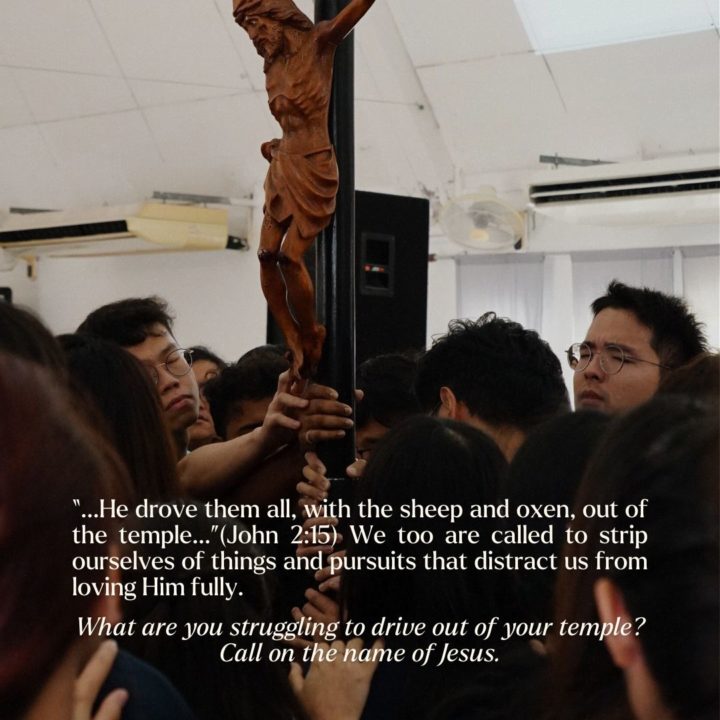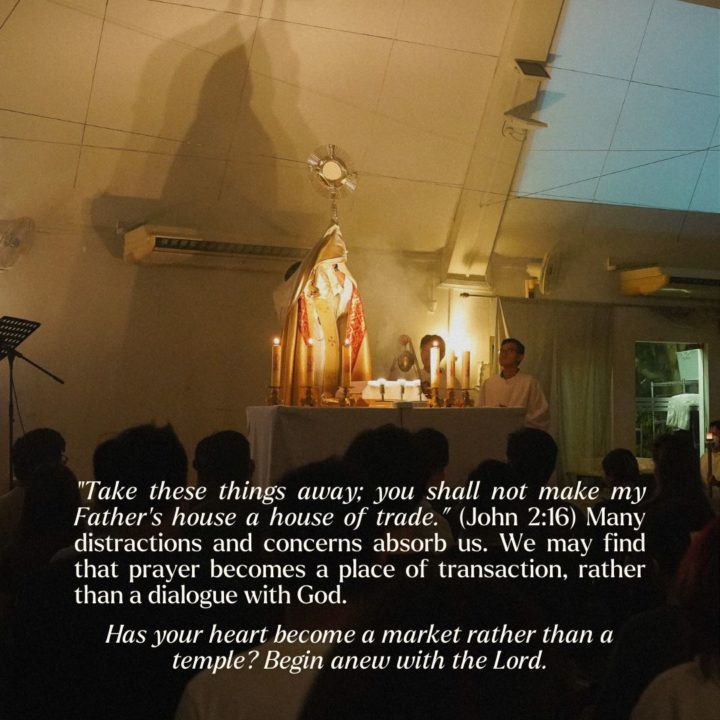By Aloisius Stephen
If Jesus were to enter our churches today, what will He find? He would not find any cattle, sheep or doves, like in today’s gospel. But will He find our hearts noisy and distracted with our worldly concerns and thoughts? Do we at times turn our prayers into a ‘market’ – a place of transaction, where we pray focused only to get what we want for ourselves. In both instances, our worship becomes directed to self. In the Bible, Jesus taught us to pray by starting with these words: “Our Father in heaven, hallowed be your name.” (Matthew 6:9). He wants us to remember that worship is about placing God first and ourselves in a relationship to Him. God is the One Thing that takes centre-stage, the highest priority in our lives that will direct our every thought and action.

Even in our attempts of putting Him above all else, we can sometimes end up cluttering the temple with well-intended things. Just like in today’s gospel, when Jesus chased the money changers and sellers away, the Jews retorted by asking “What sign can you show us for doing this?” The doves, sheep and cattle were sacrifices required for them to worship, and in a way, the sellers were offering a service to the temple-goers. Yet Jesus chased all of these out of His Father’s house. He made it clear that even the ‘good and seemingly necessary things’ they offered did not belong in the temple. In the same way, some of the good things that we desire to do in our worship could divert our focus from the Lord, especially when they turn into an obsession. It could lead us to nitpick on little things, such as that wrong tune that was sung during Mass, or being fixated on having to serve the Lord in a particular manner. We end up putting our wants, ways, and expectations first, and in the process we displace God from being the one true priority. In the same way that Jesus chased the money changers out, we too are called to strip ourselves of these unnecessary and excessive pursuits for ‘good’ which leave us distracted from truly loving God.
In my own faith journey, there was a period of time when I wanted to glorify God by showing others that it was possible to serve God while excelling in other parts of life. In university, I undertook different roles of service within the campus Catholic community and my own parish, while maintaining good grades in my studies, and still finding time to participate in social activities. Initially, when all was going smoothly, I was convinced that this was pleasing to God. But eventually, the demands from my many commitments wore me out, and left me with worries over not having enough time for everything. It was then that I realised that I was not worshipping God but rather my idea of what I thought was pleasing to Him. I came to recognise that my desire for worldly ‘perfection’ had distracted me from putting God first, that they were the ‘cattle, sheep and dove’ that had cluttered my temple. Over time, I learnt that it was actually in my weaknesses and insufficiency that I could begin to place Him above all things, as He becomes the One Thing that I cling to for strength and comfort.

Another common trap that we may fall into is the inadvertent worshipping of ourselves, due to our fallen human nature, and at times, selfish desires. To overcome this, let us listen to the wisdom of the psalmist that says “It is not sacrifice and offering that He desires but our open ear, and a heart that seeks to do His will” (Psalm 40:6-8). It is only through acknowledging our powerlessness and seeking to do His will that we can continue to put Him first. When we rely on Him, we are placing Him above ourselves.
Our worship is not meant to be limited to our quiet time of prayer or the church perimeters. We are called to worship God in every aspect of our lives, in spirit and in truth (John 4:21-24). But how can we do this? Especially amidst the hectic and mentally demanding tasks we have to undertake each day?
The Catechism of the Catholic Church offers us a simple approach (CCC 2668): “The invocation of the holy name of Jesus is the simplest way of praying always. When the holy name is repeated often by a humbly attentive heart, the prayer is not lost by heaping up empty phrases, but holds fast to the word and ‘brings forth fruit with patience.’ This prayer is possible ‘at all times’ because it is not one occupation among others but the only occupation: that of loving God, which animates and transfigures every action in Christ Jesus.”
Let us begin to invoke His Holy name through our day. When we are tired, call on the name of Jesus, for strength and continued perseverance. When our heart is filled with joy, lift up the name of Jesus in praise and thanksgiving. By repeating and holding on to Jesus’s most Holy Name, every seemingly mundane or even hectic moment can become part of our worship.
In seeking to worship God wholeheartedly, and clearing our temple of anything else but Him, we will find deeper peace as we learn to rely on Him more. Through this greater reliance, we will also begin to see that every good action and foolish mistake are opportunities of worship and surrender to Him. This Lent, I pray that we may take steps to love Him with all our hearts, all our soul and all our mind (Matthew 22:37).
This week as we reflect on the state of our ‘temple’, let us reflect on our priorities. Is there anything that has taken primacy over God? How can we desire to worship the Lord unceasingly, in spirit and truth?
Concrete action/invitation: Make time this week to sit with the Lord in the Blessed Sacrament. As you pray, ask Him to reveal the cluttered areas of your temple. Respond by committing to a concrete step to ‘declutter’ these areas with Him. (E.g prioritising prayer time, or fasting from social media.)






